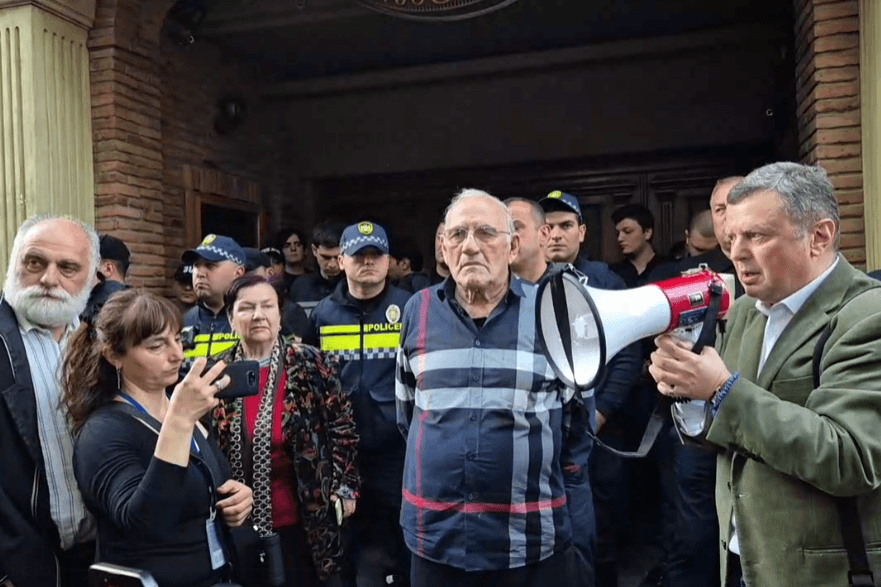
The Patriarchate of the Georgian Orthodox Church has condemned a play staged by a Tbilisi-based theatre as ‘blasphemous’. The production has come under attack in recent days from pro-government media, ruling Georgian Dream party representatives, and pro-Russian groups. The Royal District Theatre, which staged the play, is known for its outspoken stance during ongoing anti-government protests.
The play LIBERTÉ premiered six months ago, but the campaign against the theatre began only on Monday, when pro-government social media accounts began sharing short excerpts of the play. First came an audio clip just over a minute long, followed by a similarly brief video segment.
The audio clips feature explicit language describing various sexual acts, including some references to God. In turn, the video shows an actor with their bare backside exposed.
The fragments have been shared without the broader context of the two-hour play, leaving the overall message or intent unclear.
The theatre has clearly stated that attendance is restricted to those over 18, and that filming, recording, or distributing any part of the performance is strictly prohibited.
‘An attack on values’
The morning after the clips began circulating, pro-government TV channel Imedi aired them during a live broadcast. The anchor told viewers that the content had ‘outraged part of the public due to vulgar language, offence to religious sentiments, and LGBT propaganda’.
Later that day, the channel dedicated a longer segment to the play in its main evening news bulletin. The anchor accused the play’s director, Data Tavadze, of ‘insulting a faith cherished by the majority of our society’, while the reporter behind the segment described Tavadze’s work as ‘licentiousness disguised as liberalism’ and ‘an attack on values’.
At the end of the segment, the journalist pointedly highlighted Tavazde’s active participation in anti-government protests.
Georgian Dream officials soon joined the campaign, with MP Levan Makhashvili claiming that such a play was hardly surprising coming from those who ‘constantly oppose the Georgian Church and family values’.
‘Grounds for excommunication’
The campaign against the theatre moved from social and broadcast media to the street on Thursday, as far-right and pro-Russian groups gathered outside the theatre entrance.
Among the few dozen attendees were Dimitri Lortkipanidze, head of the Yevgeny Primakov Georgian–Russian Social Centre, as well as representatives of the far-right Georgian Idea party.
Among Lortkipanidze’s demands were public apologies from Tavadze, as well as Tavadze’s father, Nika Tavadze, who heads the Royal District Theatre. Lortkipanidze also demanded the termination of municipal funding for the theatre and the removal of the play from the theatre’s official programme.
‘Call it a public revision or call it censorship if you like — but it will be legitimate censorship’, he said.
Later that day, the Patriarchate of the Georgian Orthodox Church also attacked the Royal District Theatre, invoking the defence of religion and public morality.
It expressed sorrow over what it called the ‘blasphemous performance’ and stated that when art takes such a form, it becomes ‘deliberate evil’.
‘We urge the creators of the performance to repent’, the Patriarchate said, reminding the theatre representatives that ‘committing such blasphemy, if left unrepented, constitutes a ground for ecclesiastical punishment in the form of excommunication from the Church’.
‘You are the victims’
The attack on the Royal District Theatre’s play is yet another example of the Georgian Dream government’s — and its affiliated media’s — increasing intolerance toward anything that falls outside the ruling party’s social or political framework.
In recent years, government circles have increasingly attacked opponents from a moralistic standpoint, claiming to defend the Georgian Church, traditional family values, and national identity. Terms like ‘LGBT propagandist’ and ‘liberal fascist’ are frequently used by both Georgian Dream officials and pro-government media figures.
Last year, this trend was cemented at the legislative level with the adoption of anti-queer laws.
On Thursday, in response to the criticism, Tavadze posted on social media, stating that the theatre had nothing to hide and that ‘the performance itself means it is an open process and serves not to hide or conceal but to offer an open spectacle and, in the best case, even a discussion’.
‘A performance is the art of people being in one space together and, for a certain period of time, the complete perception of the work presented in this space — and not just showing the genitalia of Michelangelo’s David while concealing the rest’, he said, referring to the fragmented materials that had been circulated.
According to him, ‘the thief who broke into the performance’ and secretly filmed it, first and foremost, does not respect those who joined the process against the theatre.
‘You’re the victims’, he wrote.
According to the interpretation of OC Media staff members who viewed the performance, the title LIBERTÉ is a nod to the 18th-century French libertine tradition, as emphasised by the period costumes. The play lacks a conventional narrative, unfolding instead as a poem for four actors.
It’s fully immersive — the audience is placed on stage and gradually drawn into the performance, first through uneasy eye contact, then through direct physical interaction — both with the actors and each other.











